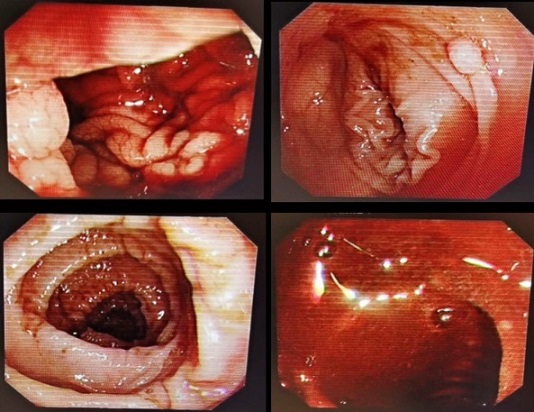Nikhil Prasad Fact checked by:Thailand Medical News Team May 12, 2025 9 months, 1 day, 23 hours, 26 minutes ago
Medical News: Doctors from China are raising alarms after discovering that COVID-19, widely known for its respiratory effects, can also cause dangerous ulcers in the small intestine—an issue that may lead to life-threatening complications if left untreated.
 Doctors Warn That COVID-19 Can Cause Dangerous Ulcers in the Small Intestine!
Doctors Warn That COVID-19 Can Cause Dangerous Ulcers in the Small Intestine!
Researchers from the Affiliated Hospital of Jining Medical University and the Cheeloo College of Medicine at Shandong University reported a rare and severe case involving a 45-year-old male patient. The man, infected with COVID-19, later developed chronic gastrointestinal complications, including painful ulcers in his small intestine. This
Medical News report highlights that such gastrointestinal effects of COVID-19 are often overlooked but could be far more common than previously realized.
A COVID-19 Case That Turned into a Digestive Emergency
The patient initially arrived at the hospital with a mild fever and an episode of fainting, eventually diagnosed as suffering from a COVID-19-induced infection. Despite aggressive treatment involving antibiotics, mechanical life support, and kidney therapy, he developed ischemic necrosis in his leg and required a mid-thigh amputation.
While doctors managed his systemic symptoms, the patient began passing dark red stools—signs of gastrointestinal bleeding. Repeated imaging scans and colonoscopies confirmed inflammation and partial obstruction in the small bowel. Despite this, initial procedures couldn’t locate the exact source of bleeding. His condition briefly improved with medication and nutritional therapy, but troubling symptoms like abdominal pain and blood loss persisted.
Follow-up colonoscopies eventually uncovered circumferential ulcers in the terminal ileum—the end portion of the small intestine. These ulcers, covered with white coatings, were surrounded by inflamed tissue and suggested deep-seated damage. Biopsies confirmed the presence of inflammatory granulation tissue, exudation, necrosis, and signs of chronic inflammation.
Complications Escalate Despite Treatment
Despite multiple hospitalizations and ongoing treatment with corticosteroids like methylprednisolone and nutritional support, the patient continued to experience severe abdominal pain. He was later admitted again with gastrointestinal perforation—a hole in the intestine wall. Emergency surgery revealed significant damage: multiple ulcers, bowel wall thickening, and abscess formation.
During surgery, doctors removed part of the small intestine and created a temporary stoma to allow healing. The histopathological examination of the removed tissue confirmed inflammation, perforation, and infiltration by immune cells. Over the next few months, the patient underwent further treatments, including a successful reversal of the stoma. Encouragingly, he showed no recurrence of abdominal pain or rectal bleeding over the course of a year of follow-up.
How COVID-19 Attacks the Gut
/>
SARS-CoV-2, the virus responsible for COVID-19, primarily affects the lungs, but it can also target the gastrointestinal tract due to the presence of ACE-2 receptors in the lining of the intestines. These receptors act as entry points for the virus, allowing it to infect the gut directly. Once inside, the virus can trigger inflammation and immune responses that damage the intestinal lining.
The researchers believe that in this case, the virus played a direct role in causing the ulcers. They also point out that COVID-19 can alter the gut microbiome—the balance of good and bad bacteria in the digestive system—resulting in further inflammation and weakening of the gut’s protective barriers. A condition known as “cytokine storm,” where the body’s immune system goes into overdrive, may also contribute to intestinal tissue damage.
The study also notes that critically ill COVID-19 patients are particularly at risk of gastrointestinal complications. These can range from mild symptoms like nausea to severe outcomes such as bowel ischemia, bleeding, obstruction, and in rare cases like this, full-thickness intestinal ulcers.
Diagnosing and Managing COVID-19-Related Ulcers
The case underscores the importance of early detection and a multidisciplinary approach. At Jining Medical University Hospital, a team including specialists in infectious diseases, gastroenterology, radiology, and pathology worked together to rule out other causes such as Crohn’s disease, tuberculosis, and viral infections like EBV or CMV.
Ultimately, the team concluded that the ulcers were most likely a result of immune-mediated damage from the COVID-19 infection. The patient responded best to nutritional therapy and anti-inflammatory treatments, rather than standard antibiotics alone—further evidence pointing to viral and immune-related origins.
A Wake-Up Call for the Medical Community
This rare case is a stark reminder that COVID-19 is not just a respiratory illness. It has the potential to damage nearly every organ system in the body, including the digestive tract. The development of small bowel ulcers adds to the growing list of long-term and severe complications seen in COVID-19 survivors.
While such cases are currently rare, they may be underdiagnosed, especially in patients who present with lingering abdominal symptoms but no respiratory distress. As this case shows, untreated intestinal ulcers can lead to perforation, infection, and even death without prompt intervention.
Conclusion
The findings from this case make it clear that COVID-19’s effects reach far beyond the lungs. Medical practitioners must remain vigilant for signs of gastrointestinal complications in COVID-19 patients, particularly those with persistent or unexplained abdominal pain. Proactive screening using imaging and endoscopic procedures could catch serious complications before they become life-threatening. This case also highlights the need for tailored treatments that include nutritional support, anti-inflammatory therapy, and in some cases, surgical intervention. As the world continues to grapple with the long-term fallout of COVID-19, understanding its diverse effects on the human body is more important than ever.
The study findings were published in the peer reviewed Journal of Inflammation Research.
https://www.tandfonline.com/doi/full/10.2147/JIR.S507209
For the latest COVID-19 News, keep on logging to Thailand
Medical News.
Read Also:
https://www.thailandmedical.news/news/breaking-covid-19-news-case-study-shows-that-even-asymptomatic-sars-cov-2-infections-can-lead-to-spontaneous-bowel-perforations
https://www.thailandmedical.news/news/covid-19-news-south-korean-doctors-warn-that-sars-cov-2-can-cause-gastric-ischemia
https://www.thailandmedical.news/news/covid-19-news-greek-study-finds-the-prevalence-of-gastrointestinal-bleeding-in-many-covid-19-patients
https://www.thailandmedical.news/articles/coronavirus
https://www.thailandmedical.news/pages/thailand_doctors_listings
